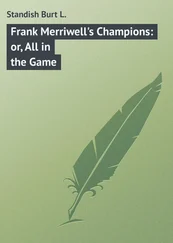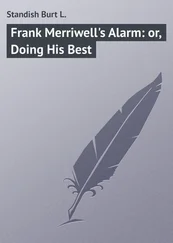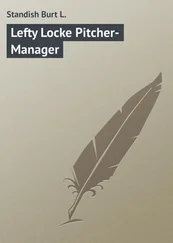Burt Standish - Frank Merriwell's Return to Yale
Здесь есть возможность читать онлайн «Burt Standish - Frank Merriwell's Return to Yale» — ознакомительный отрывок электронной книги совершенно бесплатно, а после прочтения отрывка купить полную версию. В некоторых случаях можно слушать аудио, скачать через торрент в формате fb2 и присутствует краткое содержание. Издательство: Иностранный паблик, Жанр: foreign_prose, foreign_children, на английском языке. Описание произведения, (предисловие) а так же отзывы посетителей доступны на портале библиотеки ЛибКат.
- Название:Frank Merriwell's Return to Yale
- Автор:
- Издательство:Иностранный паблик
- Жанр:
- Год:неизвестен
- ISBN:нет данных
- Рейтинг книги:3 / 5. Голосов: 1
-
Избранное:Добавить в избранное
- Отзывы:
-
Ваша оценка:
- 60
- 1
- 2
- 3
- 4
- 5
Frank Merriwell's Return to Yale: краткое содержание, описание и аннотация
Предлагаем к чтению аннотацию, описание, краткое содержание или предисловие (зависит от того, что написал сам автор книги «Frank Merriwell's Return to Yale»). Если вы не нашли необходимую информацию о книге — напишите в комментариях, мы постараемся отыскать её.
Frank Merriwell's Return to Yale — читать онлайн ознакомительный отрывок
Ниже представлен текст книги, разбитый по страницам. Система сохранения места последней прочитанной страницы, позволяет с удобством читать онлайн бесплатно книгу «Frank Merriwell's Return to Yale», без необходимости каждый раз заново искать на чём Вы остановились. Поставьте закладку, и сможете в любой момент перейти на страницу, на которой закончили чтение.
Интервал:
Закладка:
Frank colored; it was unusual and extremely unpleasant to be rebuked in this way before the entire class. He had not realized that he had left his blank papers so carelessly but even at that, he knew that the rebuke was not deserved.
"The professor has just as good reason," he reflected angrily, "to scold Ford for being careless."
There was nothing to say about it, but it made Frank bitter, and all the more determined to make his paper so correct that the professor could not help giving it a perfect mark.
He pushed his loose papers together in a pile squarely in the middle of the desk and resumed his work.
No one heard what Ford asked the professor; it was some question concerning the paper, and when the professor answered it, it was in a tone of surprise.
"I should hardly think that the question was necessary," he said, "though of course I don't blame you for wanting to be careful about it."
Ford muttered that he wanted to be sure that the problem was correctly printed on the paper, and when the professor told him that it was, he bowed and returned to his desk.
Few of the students paid any attention to this matter, and those who did promptly concluded that Ford was so anxious to lead the class that he got nervous and had therefore asked some question that any child could have understood.
The incident was soon forgotten, and for an hour or two the students worked away at their papers in silence.
The only thing that troubled Frank was that he could have completed the entire paper within an hour if he had tried.
As it was, he had worked out every problem except the last on his loose sheets of paper, and transferred most of them to his regular examination paper by the end of two hours.
He was greatly relieved to notice that none of his best friends had left the room. A few students had gone out, probably because they were utterly unable to answer the questions.
For the sake of killing time, Frank had already written out the last problem on loose paper twice, and he was now at the bottom of his pile with one sheet of blank paper left.
He glanced at the clock; almost an hour to spare. He finished his regular paper up to the last problem, and then, drawing the one remaining blank sheet toward him, began again to work that out.
Again and again he had seen Prof. Babbitt looking sharply at him, and more than once the professor had walked by his desk in the course of his strolling around the room.
Twenty minutes passed, and Frank believed that it could be of no use to waste time longer, so he crumpled up the loose sheet on which he had been working in his left hand, and started to work out the problem on his regular examination paper.
Just then Prof. Babbitt turned up from around the corner of another desk, brought his hand down upon Frank's left hand, and held it there.
"Now, then, Merriwell," he exclaimed in a thundering voice, "I've got you. This will mean your expulsion from Yale, sir, and nothing short of it."
Frank had looked up with a start of surprise at first; now he drew back and looked the professor in the eye, defiantly.
"Don't you say anything to me, sir," exclaimed the professor, sharply.
"I hadn't thought of saying anything," responded Frank, in a dignified way.
"Keep quiet, sir! what have you got in your hand?"
"My pencils."
"You're impudent, sir; I mean, of course, your other hand."
Frank's face turned first pale, and then red, and then pale again; all the students and assistants in the room were looking at him. He knew that the professor suspected him of some low trick, and it cut him deep to think that he should be accused in this public way.
"I've got a piece of blank paper there," he said, slowly, "on which I have been working out the last problem."
"Oh, indeed," returned the professor, sarcastically. "A piece of blank paper, eh? You're quite sure it was a piece of blank paper?"
"It was until I began to figure on it."
"Oh, you're quite sure of that?"
"I am, sir."
"And I can tell you, and I'll make an example of you to the whole class in so doing, that when you thought to conceal that paper by crumpling it up in your hand, I caught sight of the under side of it."
Frank made no response. He had not the slightest idea what the professor was driving at.
"I tell you, I saw what it was in an instant," added the professor.
"Very well, sir," said Frank, rather sharply, "I've nothing to say."
"Oh, you haven't! Very well, then, what's that?"
The professor pointed to the printed examination paper which lay on the desk in plain sight.
"I don't intend to be treated like a schoolboy, sir," exclaimed Frank, starting to rise, and making an effort to draw his hand away from the professor's. "If you have any accusation to make against me, you can lay it before the faculty, but I will not sit here to be browbeaten and insulted in this fashion."
He drew his hand away, but in so doing made no effort to keep his grip on the paper that he had used for figuring.
The professor snatched the paper as it was falling, smoothed it out, and held it up before the entire class.
"You see, young gentlemen," he cried, "Merriwell has been doing his examples on the back of one of the stolen examination papers."
Frank fairly gasped when he saw that this was the fact.
When the professor had announced that the two papers were missing, he had looked with the utmost care all through his desk to see whether one of the missing papers had somehow got laid down there, and was certain that only one had been given to him; yet here was one of the papers, and he had been unconsciously working out an example on the back of it.
"We shall lay this matter before the faculty at once," said Prof. Babbitt, sternly; "and meantime, Merriwell, you may leave the room."
CHAPTER VI
THE PROFESSOR'S CASE
Frank held his head high as he walked out of the room. There was a flush upon his face, but nothing there or in his manner to indicate his real feelings.
They were in truth very much confused. He was simply bewildered at the discovery of one of the examination papers on his desk.
How it got there he could not imagine. His heart burned with rage at the way in which Prof. Babbitt accused him in the presence of all the class, and he felt, too, how hopeless it would be to clear himself in the face of this damaging evidence.
Expulsion would follow, unless there could be some explanation of the matter.
Frank knew that he could explain nothing, and the thought of the disgrace that awaited him was very hard to bear. With it all, however, there was a consciousness of absolute innocence that gave him strength to leave the room much as if nothing had happened.
"My best friends will know that I am not guilty of any such conduct," he reflected, "and the rest of them may think as they like."
At the outside door of the hall, he paused, in doubt as to what he should do next. Knowing that Babbitt, already disliking him, would insist on his expulsion, Frank was inclined to go straight to his room and pack up his belongings.
The event had made everything about the college extremely distasteful to him, but it was only for a moment, and then he realized how sad he would feel at having to go away from good old Yale forever.
"It won't do," he said to himself, emphatically. "I must make some kind of effort to clear myself; there's no hope of persuading Babbitt that I'm innocent, but there must be members of the faculty who would believe me, and it would not be right to go away without trying to show them that I've been straight in this. If I should leave without making the hardest kind of a defense, everybody would be justified in believing me guilty."
With this thought in mind, Frank debated for a moment whether it would not be well to go straight to the office of the dean and tell him all he could about it.
Читать дальшеИнтервал:
Закладка:
Похожие книги на «Frank Merriwell's Return to Yale»
Представляем Вашему вниманию похожие книги на «Frank Merriwell's Return to Yale» списком для выбора. Мы отобрали схожую по названию и смыслу литературу в надежде предоставить читателям больше вариантов отыскать новые, интересные, ещё непрочитанные произведения.
Обсуждение, отзывы о книге «Frank Merriwell's Return to Yale» и просто собственные мнения читателей. Оставьте ваши комментарии, напишите, что Вы думаете о произведении, его смысле или главных героях. Укажите что конкретно понравилось, а что нет, и почему Вы так считаете.












